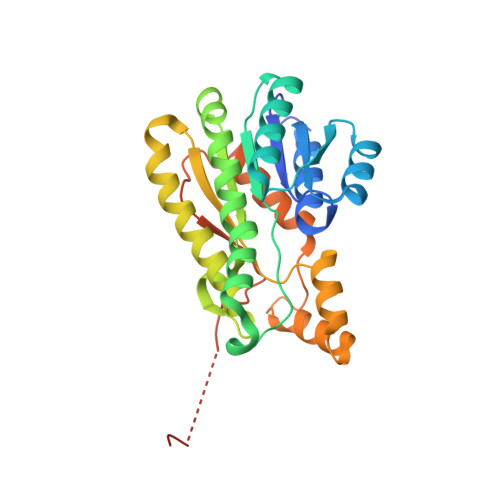Mutational and structural studies uncover crucial amino acids determining activity and stability of 17 beta-HSD14.
Badran, M.J., Bertoletti, N., Keils, A., Heine, A., Klebe, G., Marchais-Oberwinkler, S.(2019) J Steroid Biochem Mol Biol 189: 135-144
- PubMed: 30836176
- DOI: https://doi.org/10.1016/j.jsbmb.2019.02.009
- Primary Citation of Related Structures:
6FFB, 6HNO, 6QCK - PubMed Abstract:
17β-Hydroxysteroid dehydrogenase type 14 (17β-HSD14) catalyzes the conversion of highly active estrogens and androgens into their less active oxidized forms in presence of NAD + as cofactor. The crystal structure of 17β-HSD14 has been determined, however, the role of individual amino acids likely involved in the enzymatic function remains poorly understood. Objective of this study was to further characterize the enzyme by site-directed mutagenesis considering five amino acids next to the catalytic center. The tools used for the characterization of the enzyme variants are X-ray crystallography and enzyme kinetics. Lys158 was confirmed to belong to the catalytic triad. Tyr253', located on the C-terminal loop of the adjacent monomer, enters into the active site of the neighboring monomer and interacts with the catalytic Tyr154. Therefore, Tyr253' helps to tie the two monomers together. Cys255, located at the interface between both monomers, can form a disulfide bridge with the Cys255' from the adjacent monomer. In contrast to the contact provided by Tyr253, the latter interaction is not crucial for dimer formation. His93 and Gln148 are located at the rim of the substrate binding pocket. His93 does not interact directly with the ligand in the active site. However, it influences the turnover of the enzyme. The Gln148 restricts in size the access tunnel of the substrate to the binding pocket.
Organizational Affiliation:
Institute for Pharmaceutical Chemistry, Philipps University Marburg, 35032 Marburg, Germany.


















